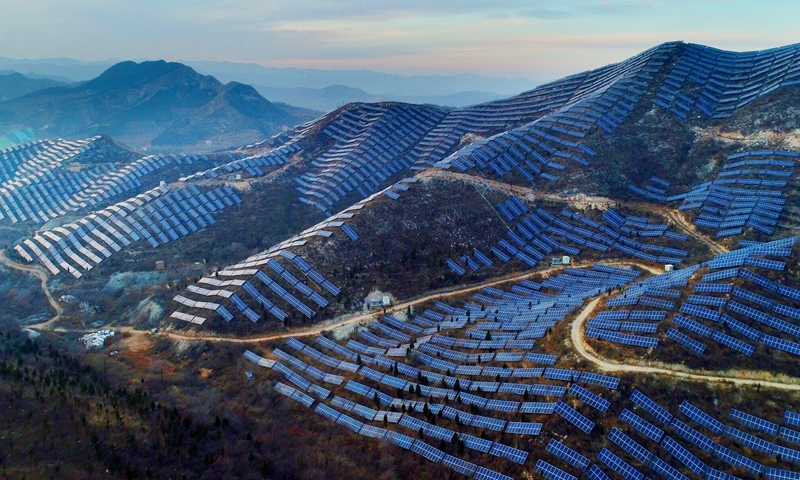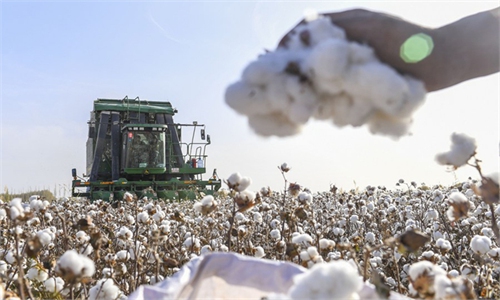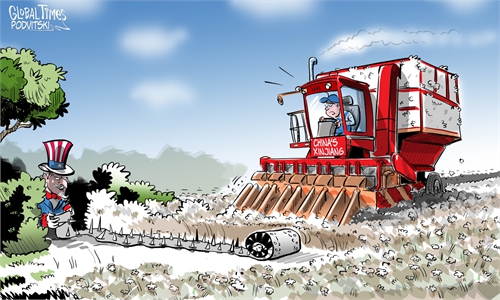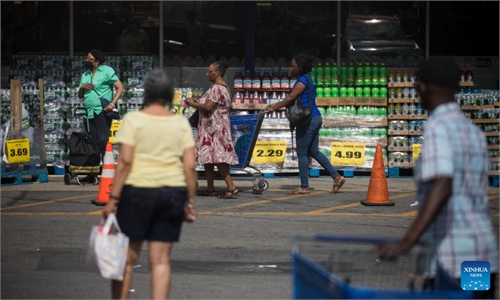Xinjiang businesses shrug off 'evil' US ban, shifts focus to booming domestic market
Impact to be limited amid booming domestic market: firms

Solar panels Photo: VCG
Chinese suppliers for the new-energy sector, ranging from polysilicon at the upstream to solar panels at the downstream, are ready to further divert their markets from the US in response to the Biden administration's import ban targeting all Xinjiang-related goods issued on Tuesday over alleged "forced labor" claims.
The latest US ban has been called by Chinese firms and experts an "evil" move aimed at pushing a considerable chunk of Chinese products out of the global supply chain. But for the pillar industries in Northwest China's Xinjiang Uygur Autonomous Region and beyond, companies said that they have become immune to US sanctions since they have developed complete supply chains domestically and embraced booming domestic demand for green energy amid the nation's carbon reduction targets.
Several Xinjiang-based companies expressed deep anger over the US sanctions against local supply chains based on the hyped allegation, but also shrugged off the impact on their businesses, they told the Global Times over the weekend.
A person with Xinjiang Nonferrous Metal Industry (Group) Co, a local state-owned maker of new-energy materials, such as polysilicon for solar panels, said that the allegation of "forced labor" is such nonsense that it doesn't even deserve a response.
"We have had very good and standardized management for decades and there is no such thing as they claim," the person said, noting that the Western media attempts to "put dirt" on Xinjiang to disrupt the advanced resources and supply chain in the region from playing a competitive role.
Amid the US import ban on Tuesday, the company was seen in the headlines of the New York Times, claiming that it was allegedly involved in using "forced labor," which the company strongly denied.
"It is the US that is using its own dark slavery history to hype fake stories against others," he said.
The person said that all employees, whether they are minorities or not, are treated equally in all aspects such as living and working conditions and pay. "Our businesses are in China, and these sanctions are not our concerns," the person said.
Other companies are also not worried about the impact of the ban, since the US is no longer their major market, sources said.
A manager of a Xinjiang-based upstream enterprise in the solar panel industry chain told the Global Times, on condition of anonymity, on Sunday that its US-related clients were no longer placing orders over concerns of being targeted by the US government, simply because his company is based in Xinjiang.
But the company is also adapting to the change by diverting to the booming domestic market away from countries such as the US and Japan, which used to take up to 60 percent of the firm's total business.
"Because of China's commitment to carbon reduction, which is unleashing huge potential at home, the domestic market is now our major focus," the manager said, indicating a puny impact the new US move could bring to his business.
While the impact from the ban on Chinese industry players is limited, its influence on the US - a huge fossil fuel consumer - is big, since it is having a hard time making a transformation to green energy, industry insiders said.
Solar power generation will make up 14 percent of the US electricity sector's total in 2035 and 20 percent in 2050, assuming there are no changes in laws and regulations, the US Energy Information Administration projected in the Annual Energy Outlook 2021 released in November 2021.
But the US will find its own solar industry hard to expand, if it won't allow Chinese companies or goods into the market, since over 99 percent of the world's silicon wafers are produced in China, and half of the country's and the world's industrial silicon and polysilicon are produced in Xinjiang, Xu Aihua, vice president of the Silicon Industry Branch of the China Nonferrous Metals Industry Association, told the Global Times on Sunday.
The ban will also hit batteries for NEVs in the US, since almost all of the main batteries in this sector come from China, with Xinjiang accounting for the largest share.
According to Benchmark Mineral Intelligence, a battery raw material consultancy, China produces nearly two-thirds of the world's lithium-ion batteries, while the US accounts for only 5 percent.
Some Biden administration officials have also opposed a one-size-fits-all import ban covering all Xinjiang-related Chinese goods, saying the move would undermine the US economy and the transition to clean energy, the New York Times reported on Tuesday.



